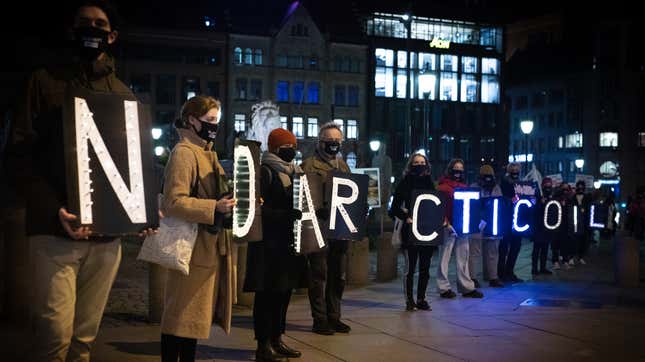
Norwegian climate activists are taking their government to court over Arctic drilling. The case’s fate could have implications for climate litigation around the world.
Organizations including Greenpeace Norway and Young Friends of the Earth Norway filed a complaint against the nation that seeks to invalidate its licenses for new oil exploration in the Arctic by ruling them unconstitutional. The lawsuit specifically targets the Norwegian government for granting licenses to 13 companies to drill for oil in the Barents Sea. The plaintiffs first filed the complaint back in 2016, but since then, the country has continued to give oil companies permits to drill even more, and the case could rule all of those permits illegitimate.
Though it has set goals to drastically reduce its greenhouse gas emissions and has a huge, advanced renewable energy sector, Norway is also one of the world’s biggest exporters of planet-warming oil and gas. It has more active oil fields now than ever and is still expanding gas drilling.
Fossil fuel extraction is wreaking havoc on Arctic ecosystems, putting Indigenous people and wildlife at risk. Drilling for oil and gas is also taking a toll on the global climate, and ironically, those effects are seen most clearly in the Arctic, since the region is warming more quickly than anywhere else in the world. On Wednesday, scientists announces that the Arctic just saw its lowest ever sea ice extent for the month of October.
This is the first ever case based on any country’s constitutional rights to environmental safety. Specifically, the case cites Norway’s 112th amendment, under which “every person has the right to an environment that is conducive to health and to a natural environment whose productivity and diversity are maintained.” It is also the first litigation in the world to invoke the 2015 Paris Agreement—which Norway was the first country to ratify—as an argument to halt oil and gas drilling.
Hearings on the suit began on Wednesday and are expected to continue until November 12, with a judgement expected in December or January. If the court rules in the plaintiffs’ favor, the implications could reach far beyond Norway.
“There are around 90 countries around the world that, like Norway, have explicit provisions in their constitutions protecting the right to a healthy environment or that have recognized this right in their jurisprudence (case law),” Daniel Bengtsson, head of communications at Greenpeace Norway, wrote in an email. That includes nations in Europe, Latin America, Asia, and Africa. Nearly 200 countries around the world have also signed onto the Paris Agreement.
The international implications should not be overstated. If it’s successful, Bengtsson said he believes the Norwegian litigation could serve as a model for climate activists around the world to file others on similar grounds. It could also influence the judiciary abroad as well.
“The case focuses on a provision in Norway’s constitution,” Michael Burger, executive director of Columbia University’s Sabin Center for Climate Change Law, said. “Other courts addressing similar cases challenging fossil fuel production, deforestation, and other policy areas might find its reasoning persuasive, and judges may even be inspired by it, but they would not have to follow it.”
Crucially, the lawsuit will raise questions about whether or not Norway should be held responsible for the greenhouse gas pollution from the fossil fuels it exports. While a strong majority of the country’s electricity comes from renewables, oil and gas are its biggest exports and the backbone of the country’s economy. These questions, too, could inform climate litigation against other fossil fuel producing countries, though again, international courts won’t have to follow the country’s lead. Still, the lawsuit marks a major step for the global climate movement, and a ruling in favor of the movement could be momentous.
“A decision finding that the nation’s constitution requires the government stop oil and gas leasing because of climate change would be major,” Burger said.